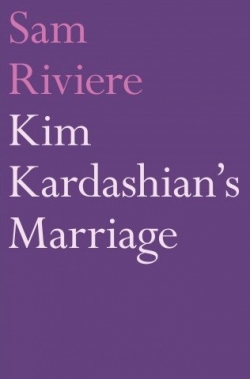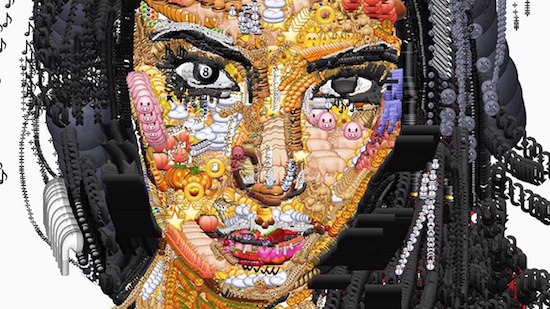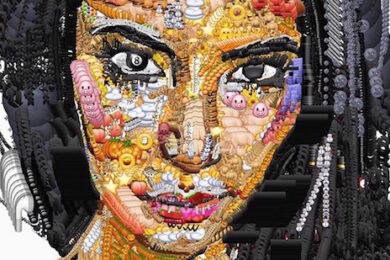Described as a “sequel of sorts” to 81 Austerities, the 72 poems of Sam Riviere’s Kim Kardashian’s Marriage were initially published as a password-protected blog available for only 72 days, representing the duration of Kim Kardashian’s marriage to Kris Humphries in 2011. The reference to Kim is initially coincidental – Riviere was searching the number 72 – but emblematic of the book’s construction, in that the apparently arbitrary connection on “72” is a direct product of Googling, just as the 72 poems are formed from the results of internet searches. The reference is also apt for the book’s interest in the experience of using the internet: just as Kim Kardashian has made her private life into something to sell, has created ‘Kim Kardashian’ out of disclosure, so we, when using the internet, exchange our privacy in return for feeling more real. Our social media profiles are an endless advertising campaign for an authentic personal brand, as we hope to pass through an Instagram filter and into our dreams. The book, continuing Riviere’s exploration of the poetics of identity, offers Kim as an inscrutable symbol of the hollowing-out of private identity into its performances. The final section of the original blog was just a photo of Kim Kardashian smiling.
This review is itself a sequel of sorts, as I wrote about these poems on their first appearance in 2013. I’ve since used Riviere’s work as a basis to explore where he and other poets, including recent ‘Faber New Poet’ Rachael Allen, have responded to how the internet has ingratiated itself into our lives and identities since the start of the millennium, and so how it, despite its innovations, has faded from the geeky to the mundane. With Kim Kardashian’s Marriage’s print publication, it seems an opportunity to revisit these poems as they too settle cosily back into the world, their purple, house-style covers disguising their strangeness.
Between his two collections Riviere published Standard Twin Fantasy, a pamphlet with Eggbox. With some written to accompany photos in a fashion magazine, these paranoiac, noir-ish poems, controlled experiments in depthlessness and male gaze, are “organised by the idea of duplication”: poems on the left page for the first half are paired with those on the right page for the second. And where in 81 Austerities we had witty, complex speakers seeking to provoke or convince or appal, Standard Twin Fantasy instead deals in troubled atmosphere, in being as trapped in the act of looking as being looked at. A memorable image is the speaker confessing “sometimes I wish to carry a full-length mirror down the middle/of a freeway.”
Kim Kardashian’s Marriage is 81 Austerities’ mirror image, its spooky double. Riviere has taken the section headings from 81A – ‘Girlfriend Heaven’, ‘Spooky Dust’ etc. – and sequentially re-combined them to create 72 titles, excluding only the combinations used in 81A. The sense, even in the titles, is that the moment of creation has somehow already taken place. These titles are then used as search terms in Google and poems are created from text found amongst the results. As a consequence, KKM has all of the standard Riviere fantasies – the distrust of stable identity, the corruption of desire into advertising, the politics of writing or art – without the speakers and their droll self-consciousness, their convoluted attempts to ironise themselves out of an ironic existence as consumers. For 81A, identities are anxiously dependent on their "cultural supports"(‘You’re Sweet’), whereas KKM gives us only a jumble of these supports, reflected back from the internet. And with its continued, persistent focus on the same orbit of ideas, its laborious generation out of the same words in different combinations, the unity of these poems as a sequence depends as much on Google as on any intention on the part of the author. In 81A Riviere mentions “when words touch each other in strange places”(‘I’m a Buddhist This is Enlightenment’); in KKM he apparently outsources this work, making it an act of data processing not unfamiliar to those of us who spend much of our lives blinking at screens.
Riviere has (perhaps a little in jest) described the book as “post-flarf,” a term used by the flarf poet Kasey Silem Mohammad. (‘Spooky,’ one of Riviere’s title words for KKM, is a key word in Mohammad’s Deer Head Nation (2003).) Following flarf poets who used Google to create poems that were as outrageous and deliberately ‘bad’ as possible, Mohammad and others have described the “post-flarf” poetry that attempts to marry this process with more conventional lyric concerns. KKM is best understood in this tradition, in that it tries to speak through rather than with its incoherence. Perhaps then a close predecessor is Katie Degentesh’s The Anger Scale (2007), which uses for its titles the questions from the MMPI psychometric test; e.g. “Sometimes I Feel As If I Must Injure Either Myself or Someone Else.” In the test, the participant rates their agreement or disagreement with these statements, and are scored on various scales accordingly. Degentesh’s poems consist of the results of Googling these statements, and so the poems are as much direct and pseudo-confessional as darkly entertaining. Rather than writing as though with “a pinball machine,” as fellow flarfist Drew Gardner described Deer Head Nation, Degentesh creates them as if she were working through the internet’s talking cure.
As collages, much of the attraction of these poems, amongst the casual chattiness of messageboards and Youtube comments, is their playful surprise; e.g.:
Melodic death metal, black metal
death metal folk and Viking metal.
29 years old.
Let’s be honest guys.
Basically you charter a catamaran
and propose to your girlfriend
(‘girlfriend sunsets’)
or
Let us draw near to Russia.
Let us go right into the presence of film criticism.
Let us celebrate music since 2002.
Let us give out pies and eat corn dogs.
(from ‘american sincerity’)
The effect is sometimes a little like making sentences from those magnetic words that stick to the fridge, as the constraints of unoriginality incite us to find the limits of what can still be said. In some of the poems, such as ‘grave hardcore,’ this Google construction is foregrounded, becoming more like scrambled lists. More often, though, the joins are disguised, (‘making the shifts and leaps disconcerting, such as in ‘thirty-three sincerity.’ Concepts like voice or speaker have little purchase when these poems drift between voices and tones, jointed together only by syntax. Because of what we know (or suspect) of their composition, these have an uncertain blank space where the lyric ‘I’ normally sits; the work of this ‘I’ moves between expression within the voices and expression in their arrangement, with an unclear distinction between the two. The (un)creative work is disguised, allowing any effects to catch us in the midst of our bewilderment.
KKM is basically only about its keywords as keywords, in their meaning to the search algorithm, with its moments of incoherence justified by their relation to the process of their composition. In this way, we come to accept the relationship between words as data. We incorporate our assumptions of a computer’s necessarily superficial comprehension into our reading processes. When the poem ‘the new heaven’ changes abruptly from being about Christian eschatology to being about a band , we recognise the homographic correspondence as part of how computers process text (just as 72 poems becomes 72 days of marriage). Moreover, we recognise the noisy competition between these meanings for this space. In these poems, our intuitive sense of the technological infrastructure of the internet merges with our interpretation of the poems, much as it has elsewhere in our lives.
In the 2006 essay that some joke killed flarf, ‘The Virtual Dependency of the Post-Avant and the Problematics of Flarf: What Happens when Poets Spend Too Much Time Fucking Around on the Internet,’ Dan Hoy accused poets who include Google in their compositional process, who herald Google as “catalyst for engaging the Other,” of blindness as to the work Google does in between, and of thereby implicitly accepting the ideology of “corporate algorithms” and their masters. Although perhaps based on a selective reading of the poets in question, he excoriates them at length, with some justification, for what he sees as a “retro-Futurist,” “utopian” vision of Google as facilitating access to a democratic, equalised internet, rather than being conscious of the “selectively hierarchical” mode of its operation. In the eight years since the essay’s publication its critique has become more relevant, as the way that our attention is directed online is even more controlled and mediated, and as the internet’s encroachment into everyday life is becoming ubiquitous and therefore invisible.
Data from cookies and from social media now allows websites such as Google to show us not only the information judged to be relevant to our requests, but the information (and, ultimately, the products or services) that it believes are relevant to us based off previous behaviour, or the behaviour of our friends (or ‘friends’). It attempts to answer requests we’ve not even made yet, and so attempts to collaborate in our self-construction as connected, social consumers. Rather than bringing the artist in contact with the Other, which Hoy describes as a “primary artistic rationale” behind flarfists’ use of Google, the internet now shows us the weird outline of our selves reflected back, our consumer identities projected outwards. If the internet is a mirror, it’s a funhouse one, warped around commercial interest in our vanities. And so in KKM, the poems never stray far from the sense that we are being sold something. The inevitable exchange behind every desirable experience or interaction is a purchase, swapping very real money for very “fake happiness” (‘ice-cream pool’), literally buying in to the realisation of the fantasy. The poems always terminate with the guilty disappointment in being asked to spend. Or, as ‘infinity sunglasses’ ends: “fucking pimped out/FREE SHIPPING”.
Just as The Anger Scale explores anger, by the challenge of the statements used in its composition, KKM is a set of poems exploring perfection, the distant focal point of desire. The poems, with their sunsets and ice cream, all take place “somewhere/that feels like the best of America” (‘ice-cream sincerity’), a hyperreal fantasy land created by films and advertising, amidst the glamour with which wealth both conceals and exposes itself. Trapped in its own keywords, in KKM everything is “always beautiful”(‘the new sunsets’):
The television weathercasters
are becoming more and more stunning
and beautiful over the years,
and some have attracted more viewers
than Bill’s ‘perfect’ English.
(from ‘beautiful weather’)
In these poems Riviere exploits a purer form of the blank irony exercised in 81A, a flat positivity which implies a distrust of the values it espouses whilst offering no alternative, reflecting how, as Linda Hutcheon writes, irony is unable “to free itself from the discourse it contests”:
You are a waitress in an ice-cream parlour.
“The orders just get better every time!”
(‘ice-cream heaven’)
This overwhelming positivity is experienced as tension, like only half of a joke. With the jumble of disembodied voices, the ‘spooky’ trace of a speaker within language, the experience is uncanny, uncomfortable and irreducibly ambiguous. It places the burden of interpretation on the reader, forcing the reader to take responsibility for the uncertainty. It gives half of a joke and then looks at you to provide the punchline, or at your need for there to be a punchline at all.
In its absorption in the perfect, KKM also represents the burden of perfection’s impossibility. Recurrent references to cameras, lenses, photos, images, etc., suggest the creation and curation of the perfect, but also the way in which we don’t so much point our cameras at things but at our idea of how the thing should look:
Three of them, barefoot, try desperately
to capture the water, a beautiful clear blue.
(from ‘thirty-three sunsets’)
It’s never certain if we’re disappointed that our cameras are too inadequate or too honest, if “infinity heaven” is attainable in the world or only in our dreams. We’re left to resolve the question of whether Kim Kardashian’s wish for “forever love”, quoted as the book’s epigraph, is admirably defiant or pathetically self-deluded, of whether the narratives we create of our lives are worth the effort we put in maintaining them.
Besides the twists and turns within individual poems, which are often funny, the overall emotional tone to KKM is tragic, in that it expresses the insufficiency of the world to our dreams. It expresses how when we constitute our identities amongst the myths of consumerism, “the best of America,” when we are increasingly invested in and interlinked with the workings of insatiable machines, this insufficiency is inescapable. The achievement of this collection is that it expresses something tragic whilst engaging with the technological structures and strictures of the 2010s, with a sophistication almost entirely lacking elsewhere in established British poetry.
- The New Heaven & The New Earth is, apparently, a band from Philadelphia.

Kim Kardashian’s Marriage is out now, published by Faber & Faber
Podcast: Play in new window | Download



